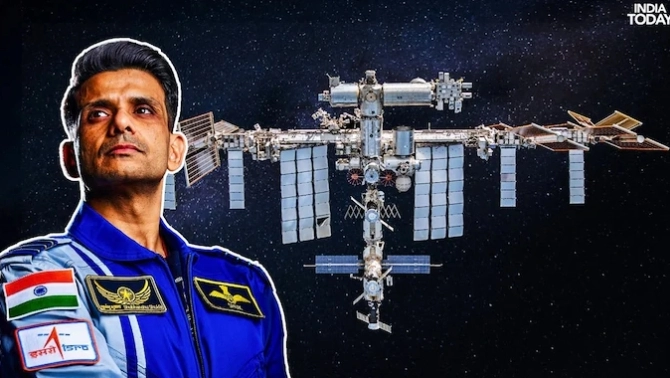
Indian astronaut Group Captain Shubhanshu Shukla will conduct a key experiment with cyanobacteria during his 14-day mission aboard the International Space Station (ISS) in May 2025.
The experiment will help develop the critical life support systems for India’s upcoming Gaganyaan program.
The study, part of the Axiom Mission-4 (Axe-4) collaboration between Isro, NASA, and the European Space Agency, aims to evaluate two strains of photosynthetic bacteria for their adaptability to microgravity and potential use in spacecraft environmental systems.
Shukla’s experiments will focus on Chroococcidiopsis and another cyanobacterial strain, analysing their growth rates, biochemical activity, and cellular responses to space conditions.
Cyanobacteria - aquatic organisms capable of oxygen production through photosynthesis - are being tested for their ability to sustain closed-loop life support systems by recycling carbon dioxide and generating breathable air.
This research builds on prior ISS experiments showing cyanobacteria’s resilience to cosmic radiation and their capacity to repair DNA damage in space.
The Axe-44 study will compare genomic stability and metabolic output between space-exposed cyanobacteria and ground controls.
Results could resolve key challenges in maintaining microbial-based systems during long-duration missions, such as those planned for Gaganyaan, India’s first crewed orbital mission slated for 2026.
Isro’s interest stems from cyanobacteria’s potential to:
Previous experiments, like NASA’s PowerCell project, demonstrated cyanobacteria’s utility in germinating Bacillus subtilis spores as proof-of-concept for symbiotic microbial ecosystems in space.
This effort aligns with India’s broader strategy to advance space biology.
Alongside the cyanobacteria study, Shukla will conduct six other experiments, including research on tardigrades (“water bears”) and space agriculture.
Meanwhile, ISRO’s Gaganyaan program is separately testing the soil bacterium Sporosarcina pasteurii aboard the MANAS pico-satellite to assess microbial behaviour in microgravity.
Successful results from Axe-4 could inform the design of compact, self-sustaining life support systems for Gaganyaan and beyond.
Growing bacteria in space is the first step toward manufacturing drugs or even 3d-printing organs in microgravity, and with private players like Skyroot Aerospace aiding preliminary tests, India aims to position itself at the forefront of space biotechnology.
Shukla’s mission represents a foundational leap in preparing for human deep-space exploration, leveraging microbial resilience to overcome the harsh realities of extraterrestrial environments.